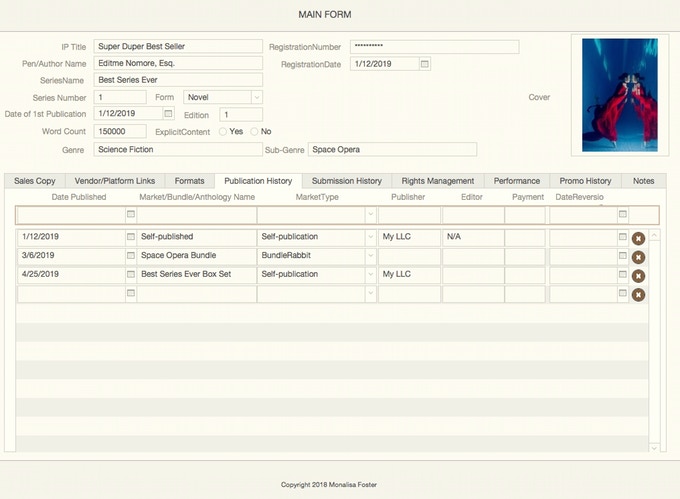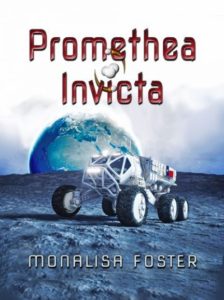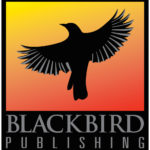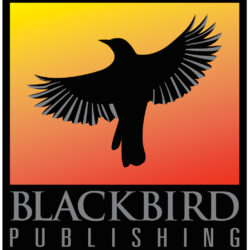What is Intellectual Property Tracker?
Intellectual Property Tracker is web-based software that allows writers to track all the important information associated with their product, i.e. their intellectual property (IP). Taglines, blurbs, sales copy, keywords, vendor and platform links, details about various formats (audio, POD, print, ebooks), publication history, submission history, IP rights management, details about advances, contracts, and promotion history, etc. Instead of keeping this important information in a tangle of spreadsheets, various documents, pieces of paper, etc., Intellectual Property Tracker allows you to have all the information in one place.

The Kickstarter ends on Wednesday, February 13th 2019, so check it out if you’d like to help fund the project AND get some of the awesome options available to supporters!
Meet Monalisa!
Monalisa is an author whose primary genre is science fiction with a bit (or a lot) of romance thrown in. She created Intellectual Property Tracker as a way to allow authors and publishers to track all the important information associated with their products.
The Interview
How can Intellectual Property Tracker help authors?
This application will free up time and energy for writing and creating. The idea for this product came out of the WMG’s Master Business Seminar in Las Vegas last fall. There I was sharing space with some incredible writers, a lot of them best sellers, most of them indies, and the ONE thing they all wanted (besides more time) was a way to manage all the information associated with their stories (i.e. their intellectual property).
Once you get to the stage where you have several stories out, you’re probably managing all sorts of information via binders, notebooks, spreadsheets, random pieces of paper, etc. The problem is that even when you do your best to keep everything up to date (whether in a spreadsheet or a notebook), taking that data and creating reports about what rights you’ve licensed, what rights are coming back to you, or which stories are performing better, or which series has the most read-through, can take up huge chunks of your time. Time that you’d be better off writing.
Let’s face it, as writers, we wear a lot of hats. And it’s easy to let details slip through the cracks, or not even be aware of which details to track. Even something simple like finding the blurb for ONE short story you wrote five years ago is going to eat into your time unless you have that information at your fingertips.
By giving you a structured system where you can organize everything in one place, Intellectual Property Tracker will free you up to do more of your creative work and spend less time looking for and managing the information associated with it.

The Kickstarter has met its funding goal, so what’s the advantage of someone supporting the Kickstarter at this point?
There are three advantages:
- saving money; the pledge levels offer you the plans at a savings.
- Dean Wesley Smith’s Magic Bakery Workshop on copyright and intellectual property is a $150 value on its own; you’re going to learn so many amazing things about copyright and how important it is to manage your rights in this class. Honestly, if you don’t know why stories are intellectual property and the value that intellectual property (IP) has to your success as a writer, you absolutely NEED this class, even if you’ve never published anything or if you’ve just had your first story accepted.
- for those that already have a few (or a dozen or a hundred) titles out and know about copyright and IP, the $500 Lifetime Plan is a Kickstarter special.
Why did you decide to create Intellectual Property Tracker?
The discussion at the WMG Publishing Master Business class was the seed for this project. Most people at the class were already attempting to do this with spreadsheets. And while spreadsheets are great for some things, what people were really trying to do required a database capable of not just tracking the information, but pulling data to generate reports and present them in a meaningful way. Some people try to use spreadsheets like a database, but often run into the problem of data integrity, and duplicate or conflicting data.
What is “The Magic Bakery,” and why is it relevant to Intellectual Property Tracker?
Dean Wesley Smith, a best-selling author and a wonderful teacher, uses the analogy of a “Magic Bakery” when discussing IP (your stories). And I think it’s an appropriate analogy for several reasons.
Imagine that your story is a pie. But unlike an apple pie in a real bakery, you only have to bake it once. You can slice it up (and not just into a dozen slices, but hundreds) and each one of those slices can be “sold” again and again.
If you’re doing it right, some of those slices come back to you to be “sold” again because unlike an apple pie, these slices don’t spoil. The slices in this case are analogous to the many different types of rights/licenses associated with your work.
This is a simplified version of things, but think of it this way:
You’ve got first publication, reprint right, audio rights, movie rights. Each one of those is a slice. Now take reprint rights. You can take that slice and make more slices if your story gets reprinted in one anthology this year and another down the road, or if your novel is part of a bundle or a box set.
Now imagine trying to track when your rights come back to you? What are your reversion dates? Did you have a snapback or clawback clause on that contract or that one? What were the reversion conditions?
Don’t know what I’m talking about? You should. And the Magic Bakery will teach you these things. That’s why it complements Intellectual Property Tracker so well and why we are so glad that Dean and WMG were generous enough to offer it for the Kickstarter.
What features do you plan to add to future versions?
We know that different writers have different workflows and that different things are important to them. Our current demo is very basic but will give you a “sketch” of the final product. It’s based on the discussion at the Master Business class. We also added a short second video based on a requested feature (the tracking and management of images).
So, as we get requests and input of what our writers want, we will continue to meet their needs. Someone wanted a way to track reviews, and that’s an example of a feature we’d add. Writers that don’t track reviews would just not use that feature.
Two things NOT in the demos are sorting features and reports. But both of those will be in the final product. So, for example, one report would allow you to look at all your titles and how they are performing, whether you want to look at that information arranged by date, venue, or market.
Another report I think is crucial is the one about reversion dates. So let’s say you want to know which titles are coming back to you in 60 (or 30 or 90 days) so that you can plan for a new cover or look for a new bundle. You’ll be able to generate a report showing you that information.
Do you want a graph showing you how well book 1 of a series is performing vs book 2 and book 3? There is going to be an easy way to do that. We know we haven’t thought of everything, but our goal is to keep our writers happy, so as long as they’re telling us what they want, we’ll continue improving Intellectual Property Tracker to meet their needs.
What story (or stories) are you working on now, and what’s fun about what you’re writing?
 I’ve just finished up a novel, a space opera (think Dune and Barrayar but with genetically-engineered samurai). I’m currently working on the sequel and another side story in the same universe (one of these, “Dominion,” is going to be included in WMG’s Fiction River series, the Face the Strange anthology edited by Ron and Bridget Collins (scheduled for 2020 release).
I’ve just finished up a novel, a space opera (think Dune and Barrayar but with genetically-engineered samurai). I’m currently working on the sequel and another side story in the same universe (one of these, “Dominion,” is going to be included in WMG’s Fiction River series, the Face the Strange anthology edited by Ron and Bridget Collins (scheduled for 2020 release).
My stories are a mix of the far-future (as in nanotech and genetic engineering) and the past, fusing the best and worst of both to create a world in which very human characters fight for what they love. There’s adventure and romance, swords and spaceships, honor and sacrifice. I had a lot of fun writing this story. It’s definitely the type of story that I myself enjoy, and I think readers will too.
I’m also collaborating on a romantic time-travel adventure (think Roman Britain) and working on a sequel to my hard sci-fi novella, Promethea Invicta.
Find Monalisa!
Monalisa won life’s lottery when she escaped communism and became an unhyphenated American citizen. Her works tend to explore themes of freedom, liberty, and personal responsibility. Despite her degree in physics, she’s worked in several fields including engineering and medicine, but she enjoys being a trophy wife and kept woman the most. She and her husband (who is a writer-once-removed via their marriage) are living their happily ever after in Texas, along with their children, both human and canine.
She learned English by reading and translating books from the juvenile section at the public library. She’d walk to the library with her dictionary and a notebook and start copying sentences and then translating them by hand. At home in the evenings, she’d take unfamiliar words and write them out ten times, or more, to get the spelling down. After a few days of this, a kindly librarian took pity on her and offered her a library card and then broke some rules in issuing one to a ten-year-old. This was back in the bad old days when kids were still free range and parents didn’t get jailed for letting them go places unsupervised. But, the library was air conditioned, an important thing when the temperature reaches triple digits, so she spent the summer there anyway, and along the way discovered Robert Heinlein and science fiction. It didn’t take long to devour the juvenile section and move on to the grown-up books.
Find Monalisa at:
Website | Facebook | Twitter | Goodreads

Sign up for the Blackbird Publishing newsletter!

One Reply to “Interview: Monalisa Foster and the Intellectual Property Tracker Kickstarter”
Comments are closed.